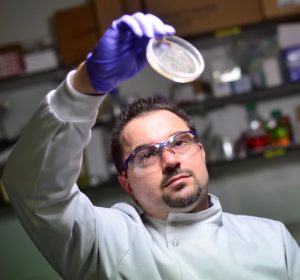Brain-penetrating ATM gene therapy
Research Project information
Principal researcher: Dr James Dixon
Institute: University of Nottingham, UK
Cost: £147,304.37 over 24 months in partnership with the AEFAT, A-T Society and BrAshA-T
Start Date: 5th of September 2022 (no cost extension granted until 31st March 2026)
What are the researchers proposing to do?
Dr James Dixon and team propose to combine gene therapy and editing to engineer an effective therapy to treat A-T in the brain. Their focus is to combine novel nanoparticle chemistry with state-of-the-art gene editing technology to replace faulty A-T genes and ‘molecularly cure’ any A-T mutation as a medicine for all patients.
In their lab, they have demonstrated that delivering genes to A-T patient cells can correct aspects of the disease, and that their gene therapy is effective when injected into healthy mouse brains. They now aim to improve how the medicine penetrates through brain tissue. In parallel they will use the most advanced gene editing technologies to replace defective A-T genes, or to provide extra ‘active’ copies.
A-T patient cells will be used to determine if their proposed treatment corrects the disease permanently. With success they will progress to deliver the therapy to brain slices and then into healthy mice. This research is in its infancy but if successful will pave the way for future trials of their technology.
Why?
There is no effective treatment targeted at the genetic defect in A-T patients, that being the lack of a functioning copy of the ATM gene. Therefore, new therapeutic approaches are required, and using genetics to provide new copies or edit the faulty copies offers a potential route to a cure.
How will the research be done?
The team will employ testing of their systems in A-T patient cells and then move to test the delivery of genes into the brains of mice. They will use modern molecular techniques to confirm how effective the therapy is and show how wide-spread the therapy can treat the entire section of the brain needed to treat A-T brains. This will be done in collaboration with colleagues at Johns Hopkins University in the USA.
How could it make a difference to the lives of those affected by A-T?
This research is early stage so will not immediately impact A-T patients. However, development of this approach in the future could help to permanently correct the gene deficiency in A-T patients, with the aim to deliver a medicine that will cure the disease. Even though the researchers are not testing the therapy within patients in this proposal, it is hoped that this will be the start of a road that will lead to treatments that will be more acceptably administered, ideally only once, to prolong life in children affected by A-T.





